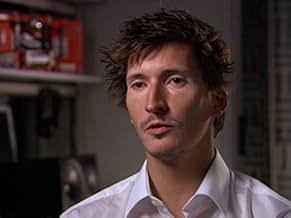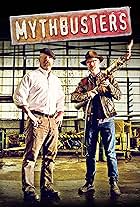Dramatized reconstruction of real-life air disasters, along with interviews with aviation experts and eyewitnesses.Dramatized reconstruction of real-life air disasters, along with interviews with aviation experts and eyewitnesses.Dramatized reconstruction of real-life air disasters, along with interviews with aviation experts and eyewitnesses.
- Awards
- 3 wins & 6 nominations
Browse episodes
Storyline
Did you know
- TriviaThis show is known as Air Disasters in the US and Mayday in Canada but is called Aircrash Investigation in Australia and parts of Europe. The Narrators however are different in the two different versions. You can find more information about the episodes on the IMDB Mayday page than you can here on the Air Disasters page.
- Alternate versionsThe French-Canadian version, "Danger dans les airs", features actor (and weekend bush pilot) Gaston Lepage as the narrator, but also as the host, appearing on screen before and after the film, and before commercial breaks.
- ConnectionsFeatured in Screenwipe: Episode #1.3 (2006)
Featured review
Most of us have flown, and have heard of those horrible airplane crashes that used to make big splashy news' headlines. They don't happen quite as often as they used to, and in our day and age of information overload, they tend to get drowned out with all the other news around the world. But, they still occasionally occur, and still draw attention.
This show, "Air Crash Investigations", "May Day", or "Air Emergency", or whatever you want to call it, delves deep into the causes and effects of many a famous air liner disaster. And, amazingly enough, despite the theatrics in the recreations, educates the viewer as to the realities of air craft functions and procedures of operation. By the end of the episode you'll feel like an aerospace engineering expert.
The format of the episodes follow a presentation of the event in brief, then an elongated version showing the developments to the event, followed by investigation and analysis. Nearly every episode has an act four that tells of the aftermath's, good and bad, of the disaster or crash that was investigated. All the while you, the viewer, are given great insight into the short comings of procedure, design or environment--more often than not it will be a combination of these factors that will lead to the inevitable; a crash of some form.
Not every episode deals with a crash landing. Sometimes the crew is able to salvage mortal failure on part of the plane, and bring things to a safe end--or, more often than not, a relative safe end. Even when the pilots can bring back a wounded bird so the show still looks into what forced the pilots into that situation, and how the event culminated in its eventful end.
One of the amazing things about this show is that the engineering aspects are explained such that any lay person, anyone who doesn't have any kind of engineering nor scientific background, are brought up to speed on the mechanics and science behind aircraft design so that they can understand, for the duration of the episode, the engineering aspects that were involved. Similarly procedures are explained as to how jets are flown, how they are berthed, how they land, takeoff, and are maintained. Interviews with key players, witnesses, experts in the field, make clear along with charts, animations and recreations provide visual cues to further explain and educate.
As a casual viewer who's flown, but flies no more, I have a curiosity about some crashes here in the United States. The series explored and explained them. I also had a curiosity about the reputation of the DC- 10 during the 70s, and the series looked into that aircraft in a series of episodes as well. All the major crashes are examined; from the bombing of Pan Am over Lockerbie Scotland, to PSA Flight 182 in San Diego, to the more contemporary events such as British Airways flight 38 in Heathrowe.
If this series has a shortcoming it's not that it caters to sensationalism (it uses that as a hook, but this is not the focus of the series), it's the actors in the recreations. It's a double edged sword with the performances because the actors needed to convey the emotional atmosphere of the participants involved, and therefore by necessity ham up the effort. It makes for an unusual viewing experience, but again gives the viewer a concept of the events and the actions of the people involved.
Well, just as car wrecks create rubber-neckers, so it is that I found this show addicting. Again, in spite of its sensationalist promotion, it is an actual documentary with elements of recreated drama interspersed between interviews and explanations. Married to it is a kind of tension that holds the show together and keeps the viewer riveted. You already know what happens, but the show is going to show you why it happened, and, hopefully, what solutions resulted from these horrible events.
It's not a show for the squeamish nor emotional. You might find yourself tearing up, being shocked, maybe outraged, but not very often will you feel settled after viewing this show.
I do recommend it, but definitely watch at your risk.
This show, "Air Crash Investigations", "May Day", or "Air Emergency", or whatever you want to call it, delves deep into the causes and effects of many a famous air liner disaster. And, amazingly enough, despite the theatrics in the recreations, educates the viewer as to the realities of air craft functions and procedures of operation. By the end of the episode you'll feel like an aerospace engineering expert.
The format of the episodes follow a presentation of the event in brief, then an elongated version showing the developments to the event, followed by investigation and analysis. Nearly every episode has an act four that tells of the aftermath's, good and bad, of the disaster or crash that was investigated. All the while you, the viewer, are given great insight into the short comings of procedure, design or environment--more often than not it will be a combination of these factors that will lead to the inevitable; a crash of some form.
Not every episode deals with a crash landing. Sometimes the crew is able to salvage mortal failure on part of the plane, and bring things to a safe end--or, more often than not, a relative safe end. Even when the pilots can bring back a wounded bird so the show still looks into what forced the pilots into that situation, and how the event culminated in its eventful end.
One of the amazing things about this show is that the engineering aspects are explained such that any lay person, anyone who doesn't have any kind of engineering nor scientific background, are brought up to speed on the mechanics and science behind aircraft design so that they can understand, for the duration of the episode, the engineering aspects that were involved. Similarly procedures are explained as to how jets are flown, how they are berthed, how they land, takeoff, and are maintained. Interviews with key players, witnesses, experts in the field, make clear along with charts, animations and recreations provide visual cues to further explain and educate.
As a casual viewer who's flown, but flies no more, I have a curiosity about some crashes here in the United States. The series explored and explained them. I also had a curiosity about the reputation of the DC- 10 during the 70s, and the series looked into that aircraft in a series of episodes as well. All the major crashes are examined; from the bombing of Pan Am over Lockerbie Scotland, to PSA Flight 182 in San Diego, to the more contemporary events such as British Airways flight 38 in Heathrowe.
If this series has a shortcoming it's not that it caters to sensationalism (it uses that as a hook, but this is not the focus of the series), it's the actors in the recreations. It's a double edged sword with the performances because the actors needed to convey the emotional atmosphere of the participants involved, and therefore by necessity ham up the effort. It makes for an unusual viewing experience, but again gives the viewer a concept of the events and the actions of the people involved.
Well, just as car wrecks create rubber-neckers, so it is that I found this show addicting. Again, in spite of its sensationalist promotion, it is an actual documentary with elements of recreated drama interspersed between interviews and explanations. Married to it is a kind of tension that holds the show together and keeps the viewer riveted. You already know what happens, but the show is going to show you why it happened, and, hopefully, what solutions resulted from these horrible events.
It's not a show for the squeamish nor emotional. You might find yourself tearing up, being shocked, maybe outraged, but not very often will you feel settled after viewing this show.
I do recommend it, but definitely watch at your risk.
- How many seasons does Air Crash Investigation have?Powered by Alexa
Details
Contribute to this page
Suggest an edit or add missing content


























